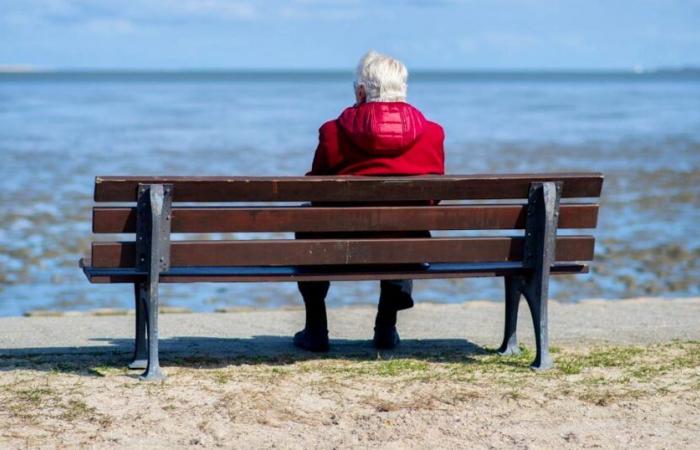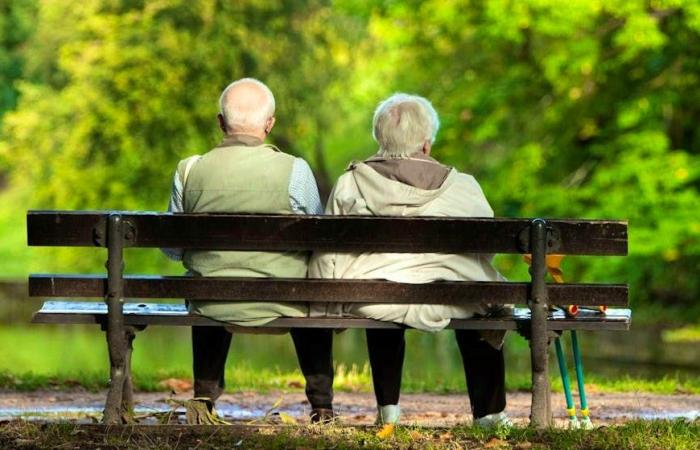After the death of his wife, a Schaffhausen receives a widower’s pension. But the 750,000 francs that she voluntarily paid into the pension fund before her death may well have been for nothing. The reason is a seemingly insignificant detail of the regulations.
Image: Hauke-Christian Dittrich/dpa
Think earlier than later: to improve their financial situation in retirement, many Swiss rely on voluntary payments into the pension fund. These purchases not only increase the retirement pension, but also bring tax advantages – especially for everyone who has already passed the age of 50.
But installments have their drawbacks. As a recent case in Schaffhausen reveals, it is worth carefully studying the pension fund regulations of the pension fund. Because in the event of death, contrary to what many policyholders expect, payment of the sum to survivors is absolutely not guaranteed.
Woman unable to work due to cancer
Thomas Gisler can speak of it tragically. As he tells the NZZ, his wife lost her fight against cancer in March 2023. Before passing away at the age of 43, this Canadian of origin had paid in four stages a total of 750,000 francs in the second pillar of the Johnson & Johnson Switzerland pension fund.
As Gisler explains, his wife was diagnosed with cancer in 2019, just months after the birth of their child. She therefore found herself 100% unable to work. His employment contract with Johnson & Johnson therefore ended. At that time, the woman’s pension fund assets amounted to around 1.1 million francs.
Until now, this sum had been transferred to a vested benefits foundation. When the woman died, Gisler received a message asking him to repatriate the money to the pension fund. It also made him believe that he would receive a refund on voluntary redemptions.
The widower complains: “The payments are lost”
Until today, however, Gisler has seen nothing of the money. The request addressed to the foundation board by the pension fund was refused. He was informed by e-mail that the provisions of the pension fund do not provide for the payment of buyouts in the event of “the death of your wife as a beneficiary of an AI pension”.
The fact that the refund did not take place can be explained by a small, subtle detail in the regulations. As the woman had received a disability pension retroactively due to her incapacity to work, she was not listed as an active member of the pension fund at the time of her death.
Certainly, the widower and the common child now receive a widower’s and orphan’s pension, but the amount would have been identical if the woman had never contributed to the pension fund. “Voluntary payments amounting to 750,000 francs are lost,” Gisler complains to the NZZ.
Image: Sebastian Kahnert/dpa-Zentralbild/dpa
Disability pension puts obstacles in the way of the widower
His deceased wife received the advance decision from the Social Insurance Office (SVA) regarding the AI pension two days before her death in the palliative care unit. Without this decision, she would have died as an active policyholder. In this case, the survivors would still have received 330,000 francs based on the risk benefits mentioned in the woman’s pension fund certificate.
But Gisler thus risks finding himself with a zero financial situation, which makes him draw up a bitter assessment: “We can slip through the cracks with pension fund buyouts in the worst scenario.” A complaint is currently pending with the Schaffhausen Supreme Court, in which he demands payment of at least 750,000 francs of voluntary redemptions – the outcome is uncertain.
The pension fund remains discreet
Questioned by the NZZ, Thomas Moser, spokesperson for Johnson & Johnson, remains discreet, except to say that “the Johnson & Johnson pension fund recommends that all employees carefully examine their individual situation and the provisions of the pension regulations before carrying out voluntary redemptions.
It further emphasizes that the payment of a death benefit constitutes an optional, non-mandatory benefit. Lukas Müller-Brunner, director of Asip, the association of pension funds, also confirms this. “A pension fund is not a charitable fund,” he says in response to the sometimes excessive demands of policyholders. A payment does not automatically entitle you to “their money”.
Instead, those who pay expect benefits in accordance with the law and regulations. “These payments can be more or less than what you saved,” says Müller-Brunner.







